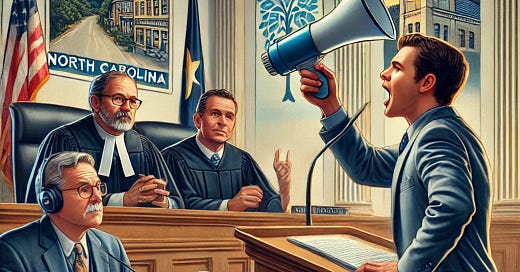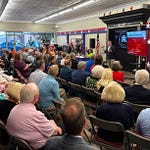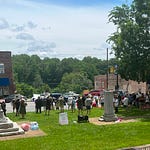Producing high-quality, in-depth news takes significant resources. At Lake Lure News / Cops & Congress, facts come first, followed by in-depth commentary and analysis. Your subscription helps support independent journalism that brings you closer to the decisions shaping the community and ensures I can continue delivering the stories that matter most.
A federal appeals court panel heard arguments Friday from a Penrose, North Carolina man who claims his First Amendment rights are violated by a city ordinance restricting amplified sound near medical clinics.
Zachary Hebb, an anti-abortion protester who has demonstrated outside an Asheville Planned Parenthood since 2019, is challenging the city’s 2021 ban on amplified sound within 150 feet of medical facilities and schools. He argues the measure prevents him from effectively communicating with patients entering the clinic. Hebb is also suing Ben Woody, the City of Asheville’s former Development Services Manager and current Assistant City Manager.
“At its core, this case is about the right to be heard,” said Hebb’s attorney, Nate Kellum, during oral arguments before the Fourth Circuit. “Mr. Hebb has a fundamental right to free speech, and that includes the right to be heard. Asheville’s ordinance unlawfully infringes on that right.”
The city, however, contends the law is a content-neutral restriction aimed at reducing noise disruptions near healthcare facilities. “As part of Reimagining Public Safety, noise ordinance enforcement shifted from APD (Asheville Police Department) to DSD (Development Services Department),” according to a Sept. 27, 2022 presentation to City Council.
Balancing Free Speech and Public Interest
Eric Edgerton, Asheville’s senior assistant city attorney, defended the ordinance as a narrowly tailored regulation that applies only during business hours.
“This circuit does not recognize an inherent right to be heard by whomever you want, wherever those persons may be,” Edgerton argued. He pointed to legal precedent upholding similar restrictions, including a Fifth Circuit ruling that upheld a 150-foot prohibition on amplified sound near Dallas hospitals in 1989.
The United States Court of Appeals for the Fourth Circuit is one of twelve regional appellate courts within the federal judicial system. The court hears appeals from the nine federal district courts in Maryland, Virginia, West Virginia, North Carolina, and South Carolina and federal administrative agencies. It does not include Texas, which is another jurisdiction.
Hebb asserted that the city’s approach is overly broad and unfairly limits his ability to engage in quiet, personal conversations with patients. “Preventing Mr. Hebb from using an amplifier or even a plastic cone to project his voice exceeds any legitimate interest in curbing excessive noise,” Kellum said.
The city maintains that banning amplification is necessary to ensure enforceability, as measuring sound levels subjectively based on decibel readings could be inconsistent.
Judges Question Limits on Speech
The panel of three judges appeared skeptical of Hebb’s argument that the First Amendment guarantees a right to be heard.
“I don’t think the First Amendment requires that he be actually heard,” said U.S. Circuit Judge James Wynn Jr., an appointee of President Barack Obama. “He is allowed to speak … The question is, where do we draw the line between protected speech and forcing others to hear it?”
Judge A. Marvin Quattlebaum Jr., a Trump appointee, questioned whether Hebb’s claim was compatible with the city’s interest in maintaining quiet near healthcare facilities. “I’ve never heard anyone speak conversationally with a cone,” he remarked.
While Hebb secured a victory at the district court level, preventing Asheville from enforcing the ordinance, the city is seeking to overturn that ruling.
“The First Amendment fully protects Zachary Hebb’s right to express his views on abortion to anyone entering the clinic,” Kellum said after the hearing. “The city’s true motivation behind this ban appears to be silencing pro-life speech.”
A decision from the Fourth Circuit is expected in the coming months. You may read the brief here.
Opinion & Analysis: Cops & Congress Commentary
Free Speech Shouldn’t Be a Casualty of Abortion Politics
A fundamental question is before the Fourth Circuit Court of Appeals: Does the First Amendment guarantee not just the right to speak, but the right to be heard? That’s what Asheville protester Zachary Hebb’s attorney argued against the ordinance banning amplified sound near medical clinics.
This isn’t just about one man with a megaphone. It’s about whether government officials can selectively silence speech they don’t like under the guise of “public interest.”
A One-Sided "Quiet Zone"
The city’s so-called content-neutral ordinance conveniently affects only one group—pro-life demonstrators. Hebb isn’t asking to shout over clinic staff. He’s asking to have a reasonable conversation with women entering the building—an effort the city seems determined to prevent. The courts have long upheld reasonable time, place, and manner restrictions, but this policy goes further. It ensures that only one side of the conversation can be heard.
To be fair, if I was one of the women seeking medical care I wouldn’t want to hear what a random man outside a clinic was saying. However, there are ways I don’t have to hear him: First, I’m mostly deaf so I can’t actually hear most speech without my transcription app going. Second, I tend to listen mostly to instrumental hip-hop music while I’m out and about, which helps drown out the background noise of environmental sounds I don’t wish to hear.
I feel that Hebb could have better means of communicating his message such as a social media or email campaign, but it doesn’t mean, in my view, that the government should limit his speech under the First Amendment.
Regulating Speech Out of Existence
When questioned, city attorney Eric Edgerton admitted that measuring decibel levels is “subjective.” Instead of refining enforcement to be fair and constitutional, Asheville took the easy route: banning an entire mode of speech.
But free speech isn’t supposed to be easy for the government to regulate. That’s the entire point of the First Amendment. Courts have repeatedly ruled that restrictions on public speech must be narrowly tailored to serve a substantial government interest—not just inconvenience a disfavored group.
And let’s be honest: The city’s interest here isn’t truly about noise. It’s about preventing women from hearing an alternative perspective before making a life-altering decision.
The Real Slippery Slope
Even those who support abortion should be alarmed by Asheville’s approach. If the government can shut down one type of speech outside medical facilities, what’s next? Will a future city ordinance silence protests outside VA hospitals? Will workers picketing outside a union-busting employer be forced to whisper?
The First Amendment is supposed to protect everyone, regardless of political affiliation. But as this case shows, selective enforcement is alive and well—especially when it serves certain interests.
Hebb already won in the lower court. If the Fourth Circuit reverses that decision, it won’t just be a loss for one protester in Asheville. It will be a setback for free speech nationwide.
Thank you for reading. Learn more about this newsletter and my background. I am guided by the Society for Professional Journalists Code of Ethics. Follow me on X (Twitter), Facebook, Linkedin, Instagram, TikTok, and YouTube. Send constructive criticism, fan mail and tips with public documents for future stories: CopsandCongress@gmail.com.













Share this post